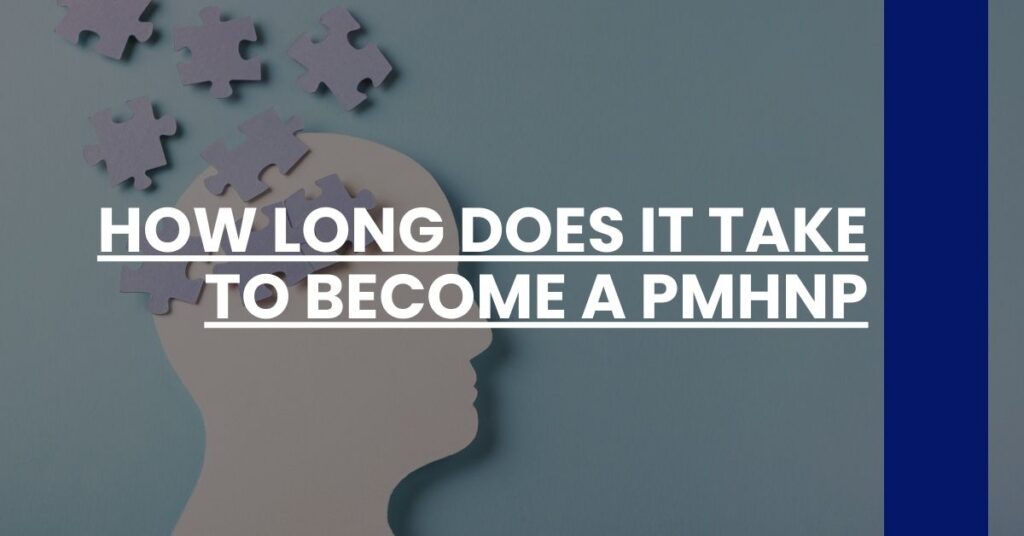How long does it take to become a PMHNP? This question holds the key to starting a career in mental healthcare.
- Education Pathways: Discover the degree programs and clinical experiences needed for PMHNPs.
- Examination and Certification: Understanding the licensure exams and certification requirements for PMHNPs.
- Continuing Education: The importance of ongoing training and specialization in the PMHNP field.
Embark on your journey to becoming a PMHNP today.
- Understanding the Role of a PMHNP
- Educational Requirements for Aspiring PMHNPs
- The NCLEX-RN Examination: Your First Professional Milestone
- Clinical Experience: Building a Foundation in Mental Health Nursing
- Graduate-Level Nursing Education: A Deeper Dive into Mental Health
- The Certification Process for PMHNPs
- State Licensure: The Final Legal Hurdle
- Continuing Education and Specialization Options
- Real-World Scenarios: Timeframes from Education to Employment
- Potential Accelerated Paths and Part-Time Options
- Conclusion: Embarking on Your PMHNP Career
Understanding the Role of a PMHNP
Psychiatric-Mental Health Nurse Practitioners (PMHNPs) serve as beacons of hope in the field of mental health. As a PMHNP, you will undertake a pivotal role, addressing the complex mental health needs of patients across the lifespan. This includes performing thorough psychiatric evaluations, creating management plans, and even prescribing medications. Your work will cut across different settings – from private practices to hospitals and beyond.
Path to a Rewarding Career
- Comprehensive Care: You will provide a holistic approach to mental health, integrating medical and psychosocial aspects into treatment.
- Diverse Patient Interactions: Expect to engage with individuals facing a range of mental health challenges, tailoring your approach to each unique situation.
- Collaboration with Professionals: Your expertise will place you in multidisciplinary teams where collaboration is key to delivering optimal care.
By embracing this vital role, you become an advocate for mental wellness, an educator for patients and families, and a leader in the design and implementation of therapeutic interventions.
Educational Requirements for Aspiring PMHNPs
To chart the route to becoming a PMHNP, your educational compass must point towards both a Bachelor’s and a Master’s degree in Nursing. The path is rigorous but rewarding, as you progressively build expertise from undergraduate to graduate studies.
Undergraduate Foundation
- Bachelor of Science in Nursing (BSN): The first waypoint in your journey is obtaining a BSN degree. This typically spans four years and lays the groundwork in nursing principles, anatomy, pharmacology, and other fundamental areas.
- Licensure Prep: Upon completing your BSN, the focus shifts to preparing for the NCLEX-RN exam to secure your license as a registered nurse.
Graduate Specialization
- Master of Science in Nursing (MSN): Your next step is pursuing a specialized MSN program with a focus on psychiatric-mental health. Spanning around two years, this program delves deeper into mental health disorders, treatment modalities, and advanced practice nursing skills.
The NCLEX-RN Examination: Your First Professional Milestone
The NCLEX-RN represents your initiation into the nursing profession. Passing this computer-adaptive test not only demonstrates your nursing competence but also paves the way for your advanced studies in psychiatric-mental health.
Strategies for Success
- Comprehensive Review: Engage in a thorough study of the test’s various content areas, which span from safe care environments to health promotion and maintenance.
- Practical Application: Practice with simulation exams can enhance your test-taking strategies and boost your confidence.
With dedication and perseverance, passing the NCLEX-RN will mark an important achievement in your professional development.
Clinical Experience: Building a Foundation in Mental Health Nursing
Embarking on clinical rotations is like stepping into a world where theory and practice converge. It’s where you start honing your skills in real-world environments, under the keen guidance of experienced mental health professionals.
Immersive Learning
- Variety of Settings: From inpatient psychiatric units to community health centers, you’ll gain exposure to diverse mental health care environments.
- Skill Enhancement: Every rotation is an opportunity to refine your ability to assess, diagnose, and collaborate on treatment plans for mental health disorders.
This period of clinical practice is invaluable, providing you with the hands-on experience that forms the cornerstone of your future as a PMHNP.
Graduate-Level Nursing Education: A Deeper Dive into Mental Health
As you embark on graduate-level education, you delve into the complexities of mental health nursing. In this phase, you’ll navigate through advanced practice concepts and sharpen your skills in providing psychiatric care.
Rigorous Curriculum
- Specialized Courses: These programs emphasize in-depth knowledge areas such as psychopharmacology and psychotherapy modalities.
- Clinical Practicum: You will undertake clinical hours that are integral to mastering the provision of psychiatric care across different patient demographics.
Mastering this level of education is pivotal, illuminating the path forward on your journey to becoming a PMHNP.
The Certification Process for PMHNPs
Before you can begin practicing as a PMHNP, certification is a critical milestone that validates your specialized knowledge and skills in psychiatric-mental health nursing. This process is rigorous but essential, ensuring that all PMHNPs meet the national standards of care for their patients.
Preparing for Certification
To pursue certification, PMHNPs must first meet specific criteria including education and clinical experience. Once these are fulfilled, you can apply to take the Psychiatric-Mental Health Nurse Practitioner Board Certification (PMHNP-BC) exam.
- Educational Prerequisites: You must complete a graduate-level PMHNP program accredited by the Commission on Collegiate Nursing Education (CCNE) or the Accreditation Commission for Education in Nursing (ACEN).
- Clinical Experience: Accumulate the required number of supervised clinical hours during your graduate program, focusing on direct patient care in the psychiatric-mental health field.
Certification Exam
The certification exam, administered by the American Nurses Credentialing Center (ANCC), assesses your capability to effectively provide psychiatric care. It covers a broad range of topics, from neurobiology and pharmacology to psychotherapy and crisis intervention.
- Register for the Exam: Once you meet all eligibility requirements, you can register for the exam through the ANCC.
- Study and Preparation: Utilize study guides, review courses, and practice questions to prepare yourself thoroughly for the exam.
- Exam Scheduling: Choose a test date that gives you ample time for preparation. The sooner you pass, the faster you’ll progress toward practicing as a PMHNP.
Successfully passing the certification exam is not only a testament to your expertise in the field but also paves the way for state licensure.
State Licensure: The Final Legal Hurdle
With your certification in hand, your next step is to obtain state licensure, which grants you the legal authority to practice as a PMHNP. Each state has its own set of requirements and processes, but the goal remains the same: to ensure that you are fully qualified to provide psychiatric care.
Licensure Process Explained
Upon passing your certification exam, it’s time to apply for licensure in the state where you intend to practice. The requirements vary, but generally, you will need to:
- Application Submission: Provide proof of your educational background, clinical experience, and national certification to the state nursing board.
- Verification of Credentials: All your credentials must be verified, often including a criminal background check.
- Licensure Fees: Pay any necessary fees associated with the licensure process.
Your PMHNP license is a profound accomplishment, symbolizing your readiness to make a significant impact in the lives of those struggling with mental health issues.
Continuing Education and Specialization Options
Once you’ve become a practicing PMHNP, your educational journey is far from over. The field of mental health is ever-evolving, requiring continuous learning and potential specialization to provide the best patient care and to stay abreast of the latest therapies and treatment modalities.
Lifelong Learning
Embrace the concept of lifelong learning by engaging in ongoing education. Several options are available:
- Continuing Education: Maintain your certification and licensure with regular continuing education units (CEUs) in psychiatric-mental health nursing.
- Specialty Certifications: Consider further certifications in subspecialties, such as addiction, geriatric mental health, or child and adolescent mental health.
- Professional Development: Attend workshops, seminars, and conferences to network with peers and learn about the latest research and advancements in your field.
These educational pursuits not only enrich your practice but also contribute to the advancement of mental healthcare as a whole.
Real-World Scenarios: Timeframes from Education to Employment
Factors such as educational background, full-time vs. part-time study, and individual state requirements often influence how long it takes to become a PMHNP. Here is a broad outline of potential timelines, delivering an idea of your journey’s length:
Typical Timeline Breakdown
- BSN Program: 4 years of undergraduate education.
- Work Experience: 1-2 years (optional but beneficial for practical experience).
- MSN Program: Generally 2-3 years of full-time graduate study.
- Certification and Licensure: Several months for study, exam, and licensure processing.
Overall, the timeline from starting a BSN program to becoming a licensed PMHNP often ranges from 7 to 9 years. Your individual circumstances, such as part-time education or accelerated programs, might lengthen or shorten this timeframe.
Potential Accelerated Paths and Part-Time Options
Understanding that life circumstances differ greatly, there are alternative pathways that can adapt to your unique situation.
- Accelerated Programs: For those who have already earned a bachelor’s degree in another field, accelerated BSN programs can condense the standard four-year curriculum into about 12 to 18 months.
- Direct Entry MSN Programs: Direct entry options are available for non-nurses with a different bachelor’s degree, combining both BSN and MSN coursework into one continuous program.
- Part-Time Study: If you need more flexibility, part-time PMHNP programs allow you to extend the duration of your studies, accommodating work or personal commitments.
These options provide versatility in managing how long it takes to embark on a PMHNP career, making the profession accessible regardless of your starting point.
Conclusion: Embarking on Your PMHNP Career
Your aspiration to become a PMHNP is a laudable pursuit, one that promises a fulfilling career serving individuals in need of mental healthcare. While the answer to “how long does it take to become a PMHNP?” varies, one thing is certain: every step along the journey is designed to equip you with the depth of knowledge and the clinical expertise required to excel in this field.
Bear in mind that as you advance through each level of education, gain clinical experience, pass your certification exam, and obtain state licensure, you are forging a path that is as rewarding professionally as it is beneficial to society. Your dedication to this process reflects a commitment to excellence in mental health care, one that will resonate throughout your career as a PMHNP.

